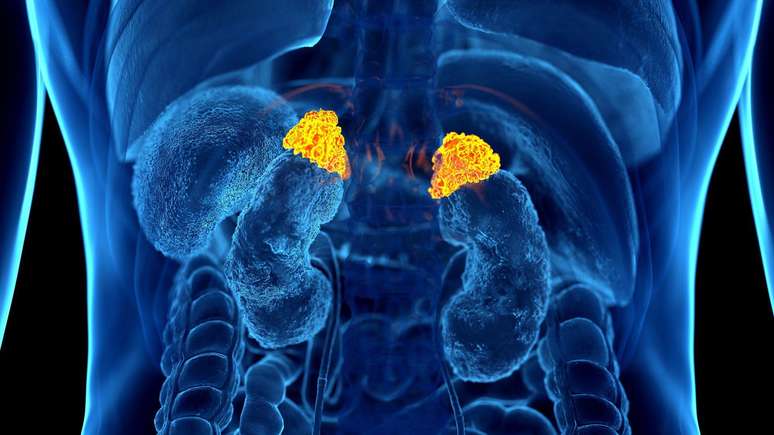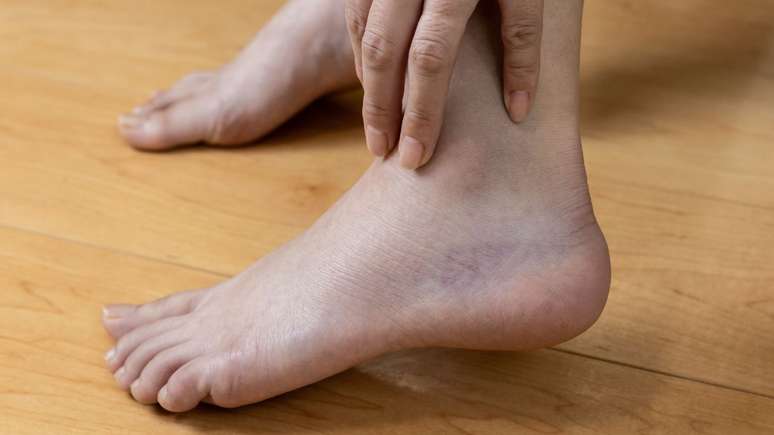The substance has earned a reputation as a bad guy, with videos on social media blaming a hormonal imbalance for weight gain, fatigue, anxiety, headaches and other ailments. See what the experts say.
A few minutes on social media and you could end up convincing yourself that your body is flooded with sky-high levels of cortisol.
Nicknamed the “stress hormone,” cortisol plays an important role in most physiological processes in the human body.
However, the substance has recently earned a reputation as a big bad, with dozens of videos on Instagram and TikTok blaming an alleged hormonal imbalance as the cause of weight gain, fatigue, anxiety, headaches and other ailments.
After all, could cortisol really be the cause of these symptoms common to so many people?
BBC News Brasil spoke to endocrinologists to understand what the consequences of high levels of this hormone could be, how to combat them and when it is necessary to consult a doctor.
What is cortisol?
Cortisol is a hormone from the steroid family, produced by the upper part of the adrenal glands, also known as the adrenal glands.
It has many functions in the human body, such as mediating the stress response, regulating metabolism, inflammatory response and immune function.
It also works as a regulator of mood, blood pressure and blood sugar.
It has been nicknamed the “stress hormone” because it is released into the bloodstream by the adrenal glands in situations perceived as risky by our body.
This release increases blood pressure and the dispersion of glucose into the blood, resulting in a momentary increase in muscle strength.
In the past the strategy was a recurring survival resource in situations with a real risk of death, but with lifestyle changes the hormone is also released in moments of stress that do not involve, for example, escaping from a predator.
In these cases it can increase the level of glucose in the blood, the use of glucose by the brain and the availability of substances that repair the body’s tissues.
Cortisol also slows down functions that would not be essential or harmful in a fight-or-flight situation: it impairs immune system responses and suppresses the digestive system, reproductive system, and growth processes.
The natural alarm system also communicates with regions of the brain that control mood, motivation and fear.

As one of the regulators of our body’s blood sugar levels and metabolism, cortisol is also responsible for managing carbohydrates, fats and proteins.
It also works to strengthen the immune system and has anti-inflammatory activity. Therefore, cortisone (a synthetic corticosteroid similar to cortisol) may be prescribed by doctors in situations of injury or inflammation.
However, the fact that cortisol has the ability to interfere with metabolism, in some cases causing fatigue, weight gain and anxiety, does not mean that an imbalance in its levels is responsible for the complaints often cited by social media video creators.
Hormonal imbalance?
Diseases that cause serious alterations in cortisol levels in the blood are quite rare, explains Alexandre Hohl, professor of Endocrinology and Metabology at the Federal University of Santa Catarina (UFSC).
Estimates vary, but according to the US Health Service, about 40 to 70 people in 1 million suffer from so-called Cushing’s disease, which is related to a high concentration of cortisone or cortisol in the patient’s body over a long period of time. . time.
For comparison purposes, according to the International Diabetes Federation, 10.5% of the world’s adult population (between the ages of 20 and 79) has some type of diabetes. That is, more than 100 thousand people per 1 million inhabitants.
Cushing’s disease is generally caused by prolonged use of cortisone medications or by the body’s abnormal production of cortisol, often due to a tumor.
But Hohl explains that the symptoms experienced by patients suffering from this disorder are usually quite intense.
These include weight gain, evident especially in the abdominal region and through pockets of fat in the neck and other regions of the trunk, very red stretch marks, acne, muscle atrophy, weakness and extreme tiredness, among others.
People affected by the disease generally have what doctors call “moon face”, which is a very rounded and large face. High glucose levels and high blood pressure are also quite common.
Adrenal insufficiency, when the adrenal glands do not produce enough of the hormone cortisol, can cause more frequent than normal tiredness, weakness, vomiting, diarrhea, low blood pressure, dizziness, and other symptoms.
Both extremes, therefore, can lead patients to experience extreme tiredness, says the UFSC professor.
But this does not mean that people who experience this symptom have one of the disorders mentioned above.
“There are millions of causes of tiredness, and in the vast majority of cases, cortisol is not the culprit,” he says.

Chronic stress can also keep cortisol levels elevated. But according to doctor and president of the Brazilian Society of Endocrinology and Metabolism Paulo Miranda, interpreting test results is extremely complex.
“Correlating cortisol levels in the morning with a stress diagnosis or using it as a tool for stress is a big mistake,” says the endocrinologist.
“People who suffer from chronic stress may have elevated cortisol levels, but… [pode] there is no correlation.”
Miranda says that for some people it is possible to discover changes in cortisol levels through blood tests, but this does not necessarily indicate any type of disorder.
The release of cortisol in our body follows the so-called circadian cycle: in short, the maximum values are observed in the early hours of the morning and the minimums during the night.
“Measuring basal cortisol, in the morning, or without standardized tests will not help us diagnose anything,” says the doctor.
“The blood test itself may be a mechanism for increasing cortisol, because many people are afraid or anxious, but this does not mean they suffer from chronic stress or another disease.”
According to the president of the Brazilian Society of Endocrinology and Metabolism, when serious changes are suspected, doctors must prescribe more comprehensive tests and make an individual diagnosis, based on several factors.
Common complaints with different causes
For this reason, experts recommend caution when using content published on social media on the topic.
Some popular videos on the TikTok app, for example, point to headaches, insomnia, anxiety, difficulty losing weight and low libido as likely signs of altered cortisol levels.
Others are even more emphatic. “Cortisol is the stress hormone and it’s what makes you go through the whole day feeling overwhelmed, tired, with your mind ruminating on many, many anxious thoughts,” says one content creator, who gives advice on how to avoid sugar consumption, increase protein consumption and even “sing in the bath” to regulate hormone levels.
Sleeping, eating healthily and doing physical activity are excellent habits, but they would not be enough, for example, to cure a person with a tumor of the adrenal glands, doctors say.
According to Alexandre Hohl, some of the disorders presented in the videos, especially fatigue, are quite common for many people today and can have different causes.
According to him, in most cases, they are related to lifestyle and not to cortisol levels.
“More than half of general complaints of tiredness, weakness or malaise are linked to lack of sleep,” he explains. “Poor sleep creates a vicious cycle of health problems. So my first question to a patient with these disorders would be ‘have you really tried to improve your sleep hygiene?’”

Paulo Miranda reinforces the idea that diagnoses must be individualized and that information disseminated in a generalized way, from often unreliable sources, should not be a cause for extreme concern.
“Many of the videos on social media today are filled with phrases that seem to come from a marketing campaign to convince people of what they are saying,” he says. “But science doesn’t work that way. Science has its uncertainties and this topic is extremely complex, full of nuances.”
When to see a doctor?
Doctors warn, however, that there are cases in which it is necessary to immediately seek the advice of a specialist.
According to Alexandre Hohl, warning signs should be combined and persistent symptoms, even when habits change.
In other words, a full picture of abdominal enlargement, intense weight gain, characteristic rounded face, red stretch marks, severe acne, and hypertension may indicate hypercortisolism and should be investigated.
“And it is the endocrinologist who is best qualified to carry out the investigation, as numerous complex interpretive tests are required.”
If diagnosed, the solution to Cushing’s disease is often surgery or radiation therapy to remove the tumors. In case of adrenal insufficiency, treatment is usually pharmacological.
Source: Terra
Ben Stock is a lifestyle journalist and author at Gossipify. He writes about topics such as health, wellness, travel, food and home decor. He provides practical advice and inspiration to improve well-being, keeps readers up to date with latest lifestyle news and trends, known for his engaging writing style, in-depth analysis and unique perspectives.









